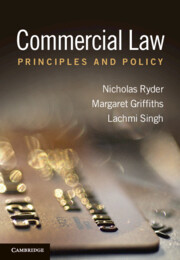Book contents
- Frontmatter
- Contents
- Preface
- List of abbreviations
- Table of Statutory Provisions
- Table of Cases
- Part 1 Agency
- Part 2 Sale of Goods and Services
- Part 3 International Trade and Sales
- Part 4 Tortious Liability for Defective Products
- Part 5 Unfair Commercial Practices
- Part 6 Banking and Finance Law
- Part 7 Consumer Credit
- Part 7 Chapter 1 The Government’s Policy towards Consumer Credit
- Part 7 Chapter 2 The Consumer Credit Act 1974
- Bibliography
- Index
- References
Part 7 Chapter 2 - The Consumer Credit Act 1974
from Part 7 - Consumer Credit
Published online by Cambridge University Press: 05 August 2012
- Frontmatter
- Contents
- Preface
- List of abbreviations
- Table of Statutory Provisions
- Table of Cases
- Part 1 Agency
- Part 2 Sale of Goods and Services
- Part 3 International Trade and Sales
- Part 4 Tortious Liability for Defective Products
- Part 5 Unfair Commercial Practices
- Part 6 Banking and Finance Law
- Part 7 Consumer Credit
- Part 7 Chapter 1 The Government’s Policy towards Consumer Credit
- Part 7 Chapter 2 The Consumer Credit Act 1974
- Bibliography
- Index
- References
Summary
Introduction
This chapter begins by briefly highlighting and commenting on the importance of the recommendations of the Crowther Committee on Consumer Credit 1971 and how it influenced the enactment of the Consumer Credit Act (CCA) 1974. The second part of the chapter provides a general discussion of the aims and objectives of the CCA 1974 and comments on its scope and application. It then provides an overview of the interpretation of several important concepts and terms within the Act. The remainder of the chapter provides a detailed discussion of the Act’s main provisions and highlights the significant amendments introduced by the Consumer Credit Act (CCA) 2006. The latter part of the chapter considers the role and scope of the Financial Ombudsman Service (FOS), the increased enforcement powers of the Office of Fair Trading (OFT) and the impact of the Consumer Credit Directive.
Crowther Committee on Consumer Credit
The introduction of the CCA 1974 is associated with the recommendations of the Crowther Committee, which in 1968 was given the broad remit to investigate and explore all forms of credit. The Committee identified several weaknesses within the then-existing consumer credit legislative framework, and it recommended the introduction of two statutes, a Lending and Security Act and a Consumer Sale and Loan Act. The proposed Lending and Security Act would ‘apply to all credit transactions … it would deal not just with the rights of the parties under the loan contract, but also with registration of the security interest and conflicts between the secured party and any third party’. Macleod commented that this recommendation ‘would fuse together all the various existing forms of legislation relating to consumer credit into one rationally coherent enactment’. However, the proposal to implement a Lending and Security Act was not acted on due to its complex nature and high cost implications, and the recommendation to introduce a Consumer Sale and Loan Act resulted in the implementation of the CCA 1974 as the ‘basis of regulation for consumer credit’. It is important to note that the principal objective of the recommendations was to provide consumers with a higher level of protection, as discussed in Part 7 Chapter 1.
- Type
- Chapter
- Information
- Commercial LawPrinciples and Policy, pp. 522 - 558Publisher: Cambridge University PressPrint publication year: 2012



